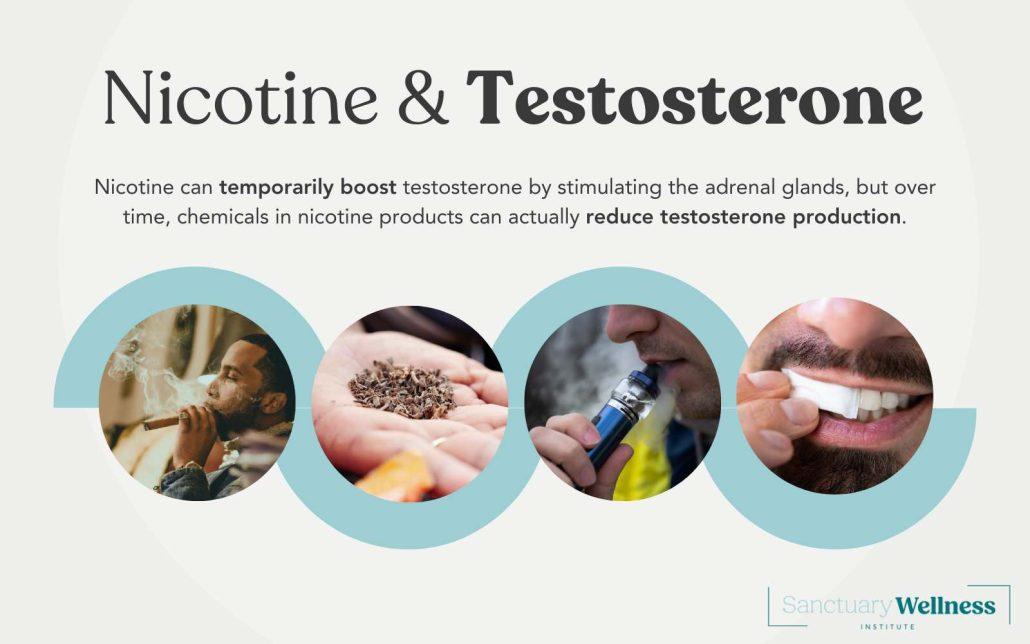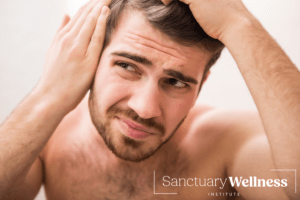- John DiBella
- Published: November 28, 2024
- Fact-checked by Dr. Desiree Granados

Nicotine and its effect on testosterone have been a topic of curiosity for years. People often wonder if using nicotine, whether through cigars, cigarettes, chewing tobacco, vapes, or nicotine pouches like Zyn, can influence testosterone levels. In this article, we’ll explore how various forms of nicotine consumption impact this hormone and what changes occur when you quit smoking.
Does Smoking Cigars Increase Testosterone?
Smoking cigars has often been associated with masculinity and power, leading some to wonder if it has any impact on testosterone levels. Studies indicate that nicotine consumption, including smoking cigars, can have short-term effects on testosterone.
Nicotine may cause a temporary spike in testosterone levels due to its effect on the adrenal glands, stimulating the release of adrenaline and other hormones. However, this effect is typically short-lived and does not contribute to sustained increases in testosterone.
Over time, the chemicals in cigars, including nicotine and tobacco toxins, can lead to oxidative stress, inflammation, and potential harm to the endocrine system, ultimately impacting testosterone production negatively.
Additionally, chronic smoking can damage the vascular system, which can impair blood flow, including to the testes. Reduced testicular function can lead to lower testosterone levels over time.

Will Quitting Smoking Increase or Decrease Testosterone?
Quitting smoking can have varying effects on testosterone, depending on an individual’s baseline health and hormone levels.
When someone quits smoking, their body begins to recover from the harmful effects of tobacco and nicotine. Over time, quitting smoking can improve cardiovascular health and circulation, leading to better testicular function and potentially higher testosterone levels.
A study published in the journal Endocrine Abstracts, suggests that men who quit smoking experience improved hormone levels, including an increase in testosterone.
However, nicotine withdrawal may temporarily impact mood and energy levels, creating the perception of decreased testosterone. This is typically a short-term side effect as the body adjusts to the absence of nicotine. The long-term benefits of quitting smoking far outweigh any temporary discomfort, as the endocrine system stabilizes, and overall health improves.
Types of Nicotine Consumption and Their Impact on Testosterone
Cigars and Cigarettes
Cigars and cigarettes are the most traditional forms of nicotine consumption. Both deliver nicotine to the body quickly, causing immediate stimulation. However, the harmful chemicals in tobacco smoke can disrupt hormone production.
Chronic cigarette smoking has been linked to decreased sperm quality and reduced testosterone levels due to the toxic effects of smoke on the reproductive system.
Chewing Tobacco
Chewing tobacco provides nicotine without smoke but still carries significant health risks. Studies suggest that smokeless tobacco can lead to increased cortisol levels, the stress hormone that can suppress testosterone production. While it may not harm testosterone levels as directly as smoking, the long-term effects on hormone health are not entirely benign.
Vaping
Vaping has gained popularity as an alternative to smoking, with many using it as a tool for quitting cigarettes. While vaping reduces exposure to harmful tobacco smoke, it still introduces nicotine to the body.
Nicotine in vapes may temporarily stimulate testosterone production, but overuse can lead to hormone imbalances and oxidative stress, potentially reducing testosterone levels over time. Additionally, certain vape liquids contain chemicals that may disrupt endocrine function.
Nicotine Pouches (Zyns)
Nicotine pouches, such as Zyns, are another smokeless nicotine delivery method. They avoid many of the harmful byproducts of smoking or vaping but still deliver nicotine to the body. While research on nicotine pouches and testosterone is limited, the effects are likely similar to other forms of nicotine consumption—short-term stimulation followed by potential long-term disruption of hormonal balance.
The Science Behind Nicotine and Testosterone
Nicotine interacts with the hypothalamic-pituitary-gonadal (HPG) axis, the hormonal system that regulates testosterone production. It can cause a temporary surge in certain hormones, such as luteinizing hormone (LH), which stimulates testosterone production in the testes. However, prolonged nicotine use can disrupt this system, reducing the efficiency of testosterone production over time.
Additionally, chronic nicotine consumption can increase cortisol levels. High cortisol levels are known to inhibit testosterone production, creating an unfavorable environment for maintaining optimal hormone levels. Nicotine-induced oxidative stress also contributes to cellular damage, including in the testes, further suppressing testosterone production.
Benefits of Quitting Nicotine for Hormonal Health
Quitting nicotine can have a significant positive impact on hormonal health, including testosterone levels. Over time, the body recovers from nicotine’s effects, allowing the HPG axis to function more efficiently. Improved circulation and reduced inflammation also contribute to better testicular health, supporting natural testosterone production. Other benefits of quitting nicotine include:
- Enhanced fertility: Improved sperm quality and count.
- Better cardiovascular health: Improved blood flow supports overall hormonal health.
- Reduced oxidative stress: Decreased cellular damage aids in hormone regulation.
Conclusion
Nicotine may cause a short-term spike in testosterone levels, but its long-term effects are generally detrimental to hormonal health. Different forms of nicotine consumption, from cigars to vaping, introduce nicotine to the body in various ways, but none are without risks. Chronic nicotine use can suppress testosterone production, harm reproductive health, and lead to long-term hormonal imbalances.
Quitting nicotine offers the best chance for restoring and maintaining optimal testosterone levels. While the process of quitting can be challenging, the long-term benefits to your health and hormone levels are well worth the effort. If you are concerned about your testosterone levels or the effects of nicotine on your health, consult a healthcare provider for personalized advice and support.
How we reviewed this article:
- Ibukun P Oyeyipo, Yinusa Raji, Adeyombo F Bolarinwa (2013). Nicotine alters male reproductive hormones in male albino rats: The role of cessation
https://pmc.ncbi.nlm.nih.gov/articles/PMC3713576/ - National Heart, Lung, and Blood Institute (2022). How Smoking Affects the Heart and Blood Vessels
https://www.nhlbi.nih.gov/health/heart/smoking - H. Hruskovicova , M. Duskova , K. Simunkova , H. Pospisilova , M. Hill , K. Vondra & L. Starka (2012). Effect of smoking cessation on hormonal balance
https://www.endocrine-abstracts.org/ea/0029/ea0029p1546 - CDC (2023). 7 Common Withdrawal Symptoms
https://www.cdc.gov/tobacco/campaign/tips/quit-smoking/7-common-withdrawal-symptoms/index.html - Jason R Kovac, Abhinav Khanna, Larry I Lipshultz (2015). The Effects of Cigarette Smoking on Male Fertility
https://pmc.ncbi.nlm.nih.gov/articles/PMC4639396/ - Navdeep Singh Kathuria, Sandeep Kumar Patel, Manjinder Kaur, Rohin Garg, Aryan Sidhu, Parveen Sharma (2024). A Study to Assess Biochemical Profile of Tobacco Chewers with Chewing Habit Over a Period of 10 Years
https://pmc.ncbi.nlm.nih.gov/articles/PMC11000947/ - Kamila Szumilas, Paweł Szumilas, Anna Grzywacz, Aleksandra Wilk (2020). The Effects of E-Cigarette Vapor Components on the Morphology and Function of the Male and Female Reproductive Systems: A Systematic Review
https://pmc.ncbi.nlm.nih.gov/articles/PMC7504689/# - Nicolas Rohleder, Clemens Kirschbaum (2006). The hypothalamic–pituitary–adrenal (HPA) axis in habitual smokers
https://www.sciencedirect.com/science/article/abs/pii/S0167876005002680#
Current Version
November 28, 2024
Written By
John DiBella
Fact-checked By
Dr. Desiree Granados
Editorial Process
Our Editorial Process

John DiBella is the co-founder and CEO at The Sanctuary Wellness Institute. His goal is to foster healthier lifestyles to improve individuals’ quality of life and health span through online medical and non-medical services. When he’s not writing health & wellness articles for The Sanctuary, he enjoys hiking, camping, surfing and sailing.







